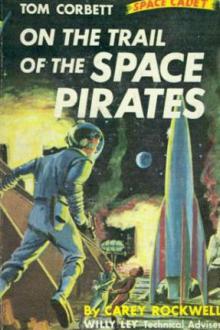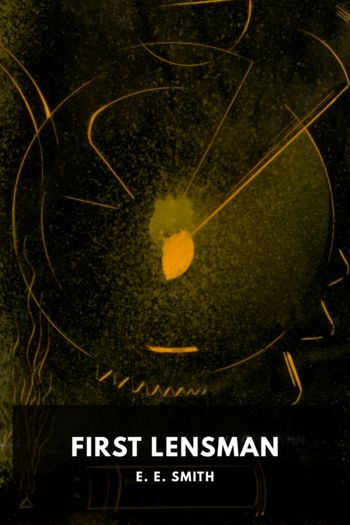Triplanetary - E. E. Smith (phonics reader TXT) 📗

- Author: E. E. Smith
Book online «Triplanetary - E. E. Smith (phonics reader TXT) 📗». Author E. E. Smith
Driving ahead and downward, at maximum power, Phryges swung his ship slowly into a right-angle collision course. The fighter’s needle nose struck the warhead within a foot of the Atlantean’s point of aim, and as he died Phryges knew that he had accomplished his mission. Norheim’s missile would not strike Atlantis, but would fall at least ten miles short, and the water there was very deep. Very, very deep. Atlantis would not be harmed.
It might have been better, however, if Phryges had died with Kinnexa on Norgrad Field; in which case the continent would probably have endured. As it was, while that one missile did not reach the city, its frightful atomic charge exploded under six hundred fathoms of water, ten scant miles from Atlantis’ harbor, and very close to an ancient geological fault.
Artomenes, as Phryges had surmised, had had time in which to act, and he knew much more than Phryges did about what was coming toward Atlantis. Too late, he knew that not one missile, but seven, had been launched from Norheim, and at least five from Uighar. The retaliatory rockets which were to wipe out Norgrad, Uigharstoy, and thousands of square miles of environs were on their way long before either bomb or earthquake destroyed all of the Atlantean launching ramps.
But when equilibrium was at last restored, the ocean rolled serenely where a minor continent had been.
III The Fall of Rome I EddoreLike two high executives of a Tellurian corporation discussing business affairs during a chance meeting at one of their clubs, Eddore’s All Highest and Gharlane, his second in command, were having the Eddorian equivalent of an after-business-hours chat.
“You did a nice job on Tellus,” the All-Highest commended. “On the other three, too, of course, but Tellus was so far and away the worst of the lot that the excellence of the work stands out. When the Atlantean nations destroyed each other so thoroughly I thought that this thing called ‘democracy’ was done away with forever, but it seems to be mighty hard to kill. However, I take it that you have this Rome situation entirely under control?”
“Definitely. Mithradates of Pontus was mine. So were both Sulla and Marius. Through them and others I killed practically all of the brains and ability of Rome, and reduced that so-called ‘democracy’ to a howling, aimless mob. My Nero will end it. Rome will go on by momentum—outwardly, will even appear to grow—for a few generations, but what Nero will do can never be undone.”
“Good. A difficult task, truly.”
“Not difficult, exactly … but it’s so damned steady.” Gharlane’s thought was bitter. “But that’s the hell of working with such short-lived races. Since each creature lives only a minute or so, they change so fast that a man can’t take his mind off of them for a second. I’ve been wanting to take a little vacation trip back to our old time-space, but it doesn’t look as though I’ll be able to do it until after they get some age and settle down.”
“That won’t be too long. Lifespans lengthen, you know, as races approach their norms.”
“Yes. But none of the others is having half the trouble that I am. Most of them, in fact, have things coming along just about the way they want them. My four planets are raising more hell than all the rest of both galaxies put together, and I know that it isn’t me—next to you, I’m the most efficient operator we’ve got. What I’m wondering about is why I happen to be the goat.”
“Precisely because you are our most efficient operator.” If an Eddorian can be said to smile, the All-Highest smiled. “You know, as well as I do, the findings of the Integrator.”
“Yes, but I am wondering more and more as to whether to believe them unreservedly or not. Spores from an extinct life-form—suitable environments—operation of the laws of chance—Tommyrot! I am beginning to suspect that chance is being strained beyond its elastic limit, for my particular benefit, and as soon as I can find out who is doing that straining there will be one empty place in the Innermost Circle.”
“Have a care, Gharlane!” All levity, all casualness disappeared. “Whom do you suspect? Whom do you accuse?”
“Nobody, as yet. The true angle never occurred to me until just now, while I have been discussing the thing with you. Nor shall I either suspect or accuse, ever. I shall determine, then I shall act.”
“In defiance of me? Of my orders?” the All-Highest demanded, his short temper flaring.
“Say, rather, in support,” the lieutenant shot back, unabashed. “If someone is working on me through my job, what position are you probably already in, without knowing it? Assume that I am right, that these four planets of mine got the way they are because of monkey business inside the Circle. Who would be next? And how sure are you that there isn’t something similar, but not so far advanced, already aimed at you? It seems to me that serious thought is in order.”
“Perhaps so. … You may be right. … There have been a few nonconformable items. Taken separately, they did not seem to be of any importance; but together, and considered in this new light. …”
Thus was borne out the conclusion of the Arisian Elders that the Eddorians would not at that time deduce Arisia; and thus Eddore lost its chance to begin in time the forging of a weapon with which to oppose effectively Arisia’s—Civilization’s—Galactic Patrol, so soon to come into being.
If either of the two had been less suspicious, less jealous, less arrogant and domineering—in other words, had not been Eddorians—this History of Civilization might never have been written; or written very differently and by another hand.
Both were, however, Eddorians.
II ArisiaIn the brief interval between the fall of Atlantis and the rise of Rome to the summit





Comments (0)